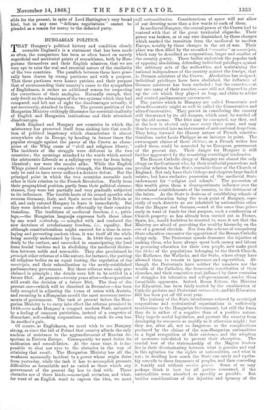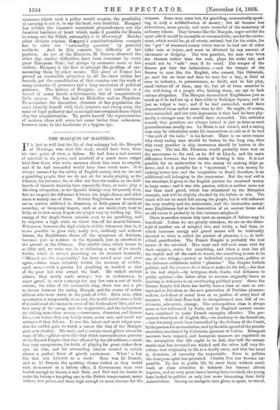HUNGARIAN POLITICS.
THAT Hungary's political history and condition closely resemble England's is a statement that has been made so often, the comparison has been so often based on merely superficial and accidental points of resemblance, both by Hun- garians themselves and their English admirers, that we are very apt to miss the real and essential nature of the similarity of the two countries. The parallels between them have gene- rally been drawn by strong partizans and with a purpose. That these partizans were honest patriots and their purpose that of recommending their country's cause to the sympathies of Englishmen, is rather an additional reason for suspecting the correctness of their analogies. Naturally enough, they only dwelt on the advantages of the two systems which they had compared, and left out of sight the disadvantages actually, if not necessarily, attached to them. The present position of the Hungarian Ministry strikingly illustrates the essential similarity of English and Hungarian institutions and their attendant disadvantages.
Both England and Hungary are countries in which the aristocracy has preserved itself from sinking into that condi- tion of political impotency which characterizes it almost everywhere else in Europe, by heading in former times the popular struggle against the power of the Crown as cham- pions of the Whig cause of " civil and religious liberty." The incidents of the struggle were different in the two countries ; the meanings attached to the words which served the aristocratic Liberals as a rallying-cry were far from being identical ; nor were the results alike. While the English Whigs gained almost a complete triumph, the Hungarian can only be said to have never suffered a decisive defeat. But the principal point in which the two countries resemble each other is their relation to the French Revolution. Partly from their geographical position, partly from their political circum- stances, they were but partially and very gradually subjected to its influences. The terrible hosts of its armed apostles who overran Germany, Italy, and Spain never landed in Britain at all, and only entered Hungary to leave it immediately. But they were defended even more effectually by their constitu- tionalism. The traditions of mediaeval freedom, i. e., privi- lege,—the Hungarian language expresses both those ideas by one word szabadsdg, — mingled with and confused the new doctrines of revolutionary freedom, i.e., equality. But although constitutionalism might succeed for a time in over- laying and perverting modern ideas, it was itself all the while being secretly undermined by them. In 1848 they rose sud- denly to the surface, and succeeded in emancipating the land from feudal burdens and in abolishing the mediaeval distinc- tion between noble and non-noble. They also proclaimed in principle other reforms of a like nature, for instance, the putting all religious bodies on an equal footing, the regulation of the municipin, and their subordination to the newly-established parliamentary government. But these reforms were only pro- claimed in principle ; the details were left to be settled in a future Diet. At present—twenty years after—these questions still await the decision of a future Diet, The time of the present one—which will be dissolved in December—has been fully occupied in adjusting the terms of union with Austria, and recasting in a Hungarian mould the most necessary instru- ments of government. The task at present before the Hun- garian Ministry is to carry into effect the reforms promised in 1848,—to make Hungary a compact modern State, animated by a feeling of common patriotism, instead of a congeries of discordant, self-seeking corporations, seeing each its own loss in another's gain.
Of course, as Englishmen, we must wish to see Hungary strong, as since the fall of Poland that country affords the only nucleus of resistance to the aggrandizement of Russian de- spotism in Eastern Europe. Consequently we must desire its unification and consolidation. At the same time, it is im- possible to shut our eyes to the obstacles in the way of attaining that result. The Hungarian Ministry has all the weakness necessarily incident to a power whose origin dates from yesterday, while the task it has to accomplish presents difficulties as formidable and as varied as those which any government of the present day has to deal with. These obstacles are of three kinds,—muncipal, sectarian, and what, for want of an English word to express the idea, we must
call nationalitarian. Considerations of space will not allow of our devoting more than a few words to each of them. In mediaeval Hungary, the central power of the Crown had to contend with that of the great territorial oligarchs. Their power was broken, or at any rate diminished, by those changes which marked the transition from the mediaeval to modern Europe, notably by those changes in the art of war. Their place was then filled by the so-called " counties " or nurnicipia, which may be described as corporations, larger and smaller, of the country gentry. These bodies undertook the popular task of opposing absolutism, defending individual privileges against the arbitrary acts of the authorities, and maintaining the national independence of the country against the foreign, that is, German ministers of the Crown. Absolutism has resigned, individual privileges have been abolished, the influence of German ministers has been excluded ; but the counties,—at any rate many of their number,—are still not disposed to give up the role which they played so long, and claim to advise and control parliamentary government. The parties which in Hungary are called Democratic and ultra-Democratic might as well be called the Conservative and ultra-Conservative. They persist in considering the country still threatened by its old dangers, which must be warded off by the old means. The Diet may be corrupted, say they, and at the best is elected only once every three years, and may thus be converted into an instrument of anti-national despotism. They bring forward the illusory nature of French constitu- tionalism under Louis Philippe as an instance in point. The extravagant claims of these die'tines, as a French writer has called them, could be conceded by no European government of the present day. Their danger for Hungary is still further aggravated by the remaining centrifugal tendencies.
The Roman Catholic clergy of Hungary are almost the only clergy on the Continent who, by their territorial possessions and peculiar relation to the State, resemble those of the Church of England. Not only have their bishops and chapters large landed estates, but have exclusive possession of the mediaeval State endowment for " religion and schools." The possession of this wealth gives them a disproportionate influence over the educational establishments of the country, to the detriment of the latter. As the State is desirous of establishing schools of its own,—education being the weak point of Hungary, espe- cially of such districts as are inhabited by nationalities other than the Magyar and German,—and at the same time griev- ously in want of funds for that purpose, such a confiscation of Church property as has already been carried out in France, Spain, &c., would doubtless be resorted to, were it not that the Ministry are afraid of provoking the wealthy hierarchy on the eve of a general election. Nor does the scheme of compulsory State education encounter the opposition of the Roman Catholic clergy only. The Protestant synods denounce the injustice of making them, who have always spent both money and labour in procuring education for their own people, now make good the (aches of the populations belonging to the Greek Church, the Ruthenes, the Wallachs, and the Serbs, whose clergy have allowed them to remain in ignorance and superstition. Al- though the Protestants have neither the numbers nor the wealth of the Catholics, the democratic constitution of their churches, and their combative zeal, inflamed by three centuries of struggles for toleration and self-government, render them formidable opponents. Indeed, Baron Eiitvos, the Minister for Education, has been fairly routed by the combination of Catholic prelates and Protestant autonomists, and his Education Bill has been put off till next year.
The jealousy of the State interference evinced by municipal corporations and ecclesiastical organizations is sufficiently troublesome to the Hungarian Government, but still the harm they do is rather of a negative than of a positive nature. They impede useful legislation, and prevent the country from developing its resources as rapidly as it otherwise might ; but they are, after all, not so dangerous as the complications produced by the claims of the non-Hungarian nationalities to a legal recognition of their existence, and the adoption of measures calculated to prevent their absorption. Tho
crucial test of the statesmanship of the Magyar leaders lies in their discriminating between what is genuine and real in this agitation for the rights of nationalities, and what is not ; in deciding how much the State can safely and equita- bly concede to these fragments of peoples, and then conceding it frankly and without arrii,,re pen.Fe.e. Some of us may perhaps think it best for all parties concerned, if the nationalities were absorbed as speedily as possible. But besides considerations of the injustice and tyranny of the measures which such a policy would require, the possibility of carrying it out is, to say the least, very doubtful. Hungary has neither the immense numerical preponderance nor the fanatical hardness of heart which make it possible for Russia to stamp out the Polish nationality is la ..11ourauiej: Besides other obvious reasons, ILAngary's constitutionalism compels her to solve the " nationality question " by peaceful methods. And in this consists the difficulty of her position. As one of the Ministers, M. Gorove, observed the other day, similar difficulties have been overcome by every great European State, but always by measures more or less violent ; Hungary is the first to attempt the problem of sur- mounting them by other means. The glory of France has proved an irresistible attraction to all the races within her bounds, yet the consolidation of that country was the work of many centuries of greatness and a long succession of political geniuses. The history of Hungary, on the contrary, is a record of many heroic achievements, but of comparatively little success. She has had no Richelieu and no Napoleon. To assimilate the discordant elements of her population, she must identify herself with their interests and sweep away the mass of legal pedantry and municipal narrowmindedness which clog her administration. To prove herself the representative of modern ideas will serve her cause better than references, however true, to the traditions of a bygone age.



































 Previous page
Previous page